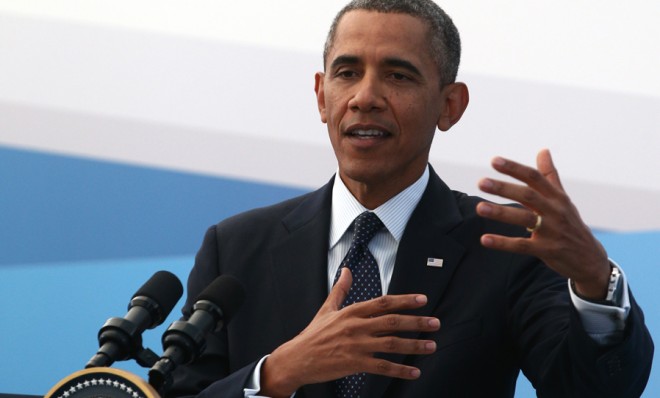Tripping over the Syria solution
Bad for Obama, but good for the world?


A free daily email with the biggest news stories of the day – and the best features from TheWeek.com
You are now subscribed
Your newsletter sign-up was successful
Speaking at the Center for American Progress this morning, National Security Adviser Susan Rice encapsulated the Obama administration's transitive theory of Syria strikes in a single sentence:
We cannot allow terrorists bent on destruction or a nuclear North Korea or an aspiring nuclear Iran to believe for one minute that we are shying away from our determination to back up our long-standing warnings.
In other words: No matter what the consequences of our actions, the U.S. must act, in order that those who are not acting because they fear U.S. action will come to believe that the threat to punish proliferation with military action is empty.
The Week
Escape your echo chamber. Get the facts behind the news, plus analysis from multiple perspectives.

Sign up for The Week's Free Newsletters
From our morning news briefing to a weekly Good News Newsletter, get the best of The Week delivered directly to your inbox.
From our morning news briefing to a weekly Good News Newsletter, get the best of The Week delivered directly to your inbox.
It's hard to look at the recent history of U.S. military interventions and come to that conclusion, actually.
The U.S. seems to earmark explosive ordinance for every loud-mouth jihadist with a cell phone. Responses to provocation from North Korea were met by the threat of dropping nuclear bombs. And Libya, and Afghanistan, and drones in Pakistan, and Yemen, and Somalia, and Iraq, and all that.
The only way that Iran and North Korea come to believe that the failure to punish Syria for its use of chemical weapons is a license for those countries to pursue belligerent foreign policies is if the U.S. government suddenly concedes that the two sets of foreign policy crises are equivalent. They aren't. The threats posed by North Korea and Iran are existential, definable, and contained. If a Syrian general decides to use a particularly deadly weapon in the suburbs of his country's capital city, a distant country's hesitancy to respond military may embolden him.
Far too often, the Obama administration likes to announce that its intended actions amount to a shot across a bow somewhere, which is rather like a pitcher telling a batter that he's about to bean him. This denudes the power behind the action, turning it into a rhetorical game.
A free daily email with the biggest news stories of the day – and the best features from TheWeek.com
Recognizing the perceived and actual limits of U.S. power, hard and soft, Obama has always wanted regional powers to take more responsibility for moral calamities in their area of influence. With Syria, I think he made a mistake. It is in many ways the perfect test case for this new form of interest-balancing. Instead, Obama fell back upon old arguments. I don't think he ever believed that Syria would use chemical weapons, so I don't think he contemplated a world wherein they could do so and not immediately be punished military. Though the administration is now taking credit for floating the idea of a Russian chemical weapons seizure at the G-20 summit, I'm not sure why they didn't insist that Russia propose this from the start. YOU deal with it, Putin, or we will. Not — let's all agree on something that none of us are going to agree on. Forcing Russia to take responsibility for Assad's actions is exactly the right way to force Putin to feel and share the burden of power. Right now, it seems that Putin is picking up a ball dropped by the U.S., and saying, in effect, "All right, well, here's how adults handle this."
It's kind of embarrassing, and politically, probably terribly damaging, for the Obama administration to have fallen back and blundered into the solution its actual foreign policy would have recommended, but it may hasten the discussions that lead to the beginning of the end of the Syrian crisis. The U.S. will have to lead not from behind, but from somewhere way outside of the negotiating room.
Marc Ambinder is TheWeek.com's editor-at-large. He is the author, with D.B. Grady, of The Command and Deep State: Inside the Government Secrecy Industry. Marc is also a contributing editor for The Atlantic and GQ. Formerly, he served as White House correspondent for National Journal, chief political consultant for CBS News, and politics editor at The Atlantic. Marc is a 2001 graduate of Harvard. He is married to Michael Park, a corporate strategy consultant, and lives in Los Angeles.
